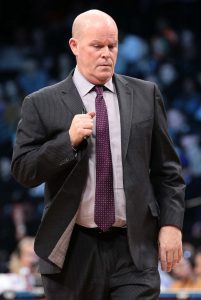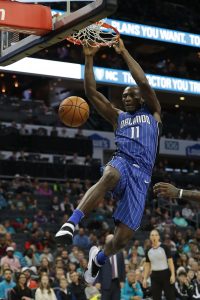The Magic have found themselves in the NBA’s version of no-man’s land in recent years. The franchise hasn’t secured a playoff berth since Stan Van Gundy coached the club back in 2012. However, a rebuilding period with Rob Hennigan at the helm topped out at 35 wins in 2015/16. Over the last two seasons, Orlando’s win total has been on the decline again, and the club now appears fully immersed in a re-rebuilding process under new management.
Magic general manager John Hammond and president of basketball operations Jeff Weltman, who assumed control of the front office in 2017, haven’t yet put a stamp on the franchise with an impact acquisition, but they’ll have a chance to do so soon when they name a replacement for former head coach Frank Vogel, who was let go at season’s end.
Here are five key questions facing the franchise this summer:
1. Who will the Magic hire as their new head coach?
Of the eight teams who have conducted head coaching searches this spring, five have made a hire, and two others arrived late to the market after dismissing their former coaches in early May. That leaves the Magic, who fired Vogel the morning after the regular season ended, as the team with the longest-lasting search for a new bench boss — Orlando’s search will hit the seven-week mark this Thursday.
The Magic have kept things very close to the vest as they interview candidates. Several potential contenders have emerged, including Trail Blazers assistant David Vanterpool, Spurs assistant Ime Udoka, former Hornets head coach Steve Clifford, and University of Houston coach Kelvin Sampson. However, there has been little indication which way Orlando is leaning.
With few clues from the Magic, we can only speculate on which candidate might become the new head coach in Orlando, but it would make sense for the team to follow a similar blueprint to the Hawks. Atlanta, in the midst of a rebuild, opted for an experienced assistant – Lloyd Pierce of the Sixers – who has a strong player development background, but no NBA head coaching experience. The Magic could use someone with a similar skill-set, rather than opting for a veteran head coach with a mandate to get the team to the playoffs right away.
2. What will the Magic do with the No. 6 pick?
A year ago, the Magic used the sixth overall pick to draft Jonathan Isaac, a raw, athletic forward with tremendous potential. The pick made sense for a front office led by Weltman and Hammond — in their previous jobs in Toronto and Milwaukee, respectively, those execs rolled the dice on similar projects, for better (Giannis Antetokounmpo) or for worse (Bruno Caboclo).
If the Magic follow a similar path this year, the team may be hoping that a player like Mohamed Bamba or Jaren Jackson Jr. is still available at No. 6. However, there’s another intriguing option who should be on the board when the Magic are on the clock — Oklahoma’s Trae Young, the nation’s leading scorer in 2017/18. A popular college player, Young could help generate some interest in a franchise that lacks star power. More importantly, he’d provide a huge lift to a backcourt bereft of dynamic playmaking.
3. Will Aaron Gordon be back?
Gordon may have been the closest thing the Magic had to a star-caliber player last season. Although he was a little less effective later in the season than he was at the start, Gordon enjoyed a breakout year overall, establishing new career highs in PPG (17.6), RPG (7.9), APG (2.3), 3PT% (.336), and several other categories. He’s also still just 22 years old, meaning there should be plenty of room for further growth.
Still, it’s not a lock that Gordon will be back in Orlando next season. The former fourth overall pick is a restricted free agent, so the Magic can match any offer sheet he signs, but the new management group didn’t draft him, and chose not to extend him last fall. Additionally, the club may view Isaac as its power forward of the future, meaning a long-term contract for Gordon could impede Isaac’s development.
Generally speaking, it’s not a great idea for a rebuilding club to let a promising 22-year-old player walk for nothing, so I’d be a little surprised if the Magic take that approach with Gordon — especially if no teams with cap room make an aggressive play for him. However, this will be a situation worth keeping an eye on during the first week of July.
4. Will the Magic have any cap room available?
The Magic’s handling of Gordon will likely determine whether or not the team has any cap space available this offseason. Bringing him back would almost certainly result in Orlando remaining an over-the-cap team — even if Gordon simply signs his $7.2MM qualifying offer with an eye toward unrestricted free agency in 2019, it’d be tricky for the Magic to create real cap room without making trades.
A lack of cap space shouldn’t have a major adverse effect on the Magic’s offseason plans. After all, it’s not as if the team wants to make a big splash on the free agent market this year. Still, considering how many teams will be over the cap in 2018, it would have been nice if the Magic could have carved out some space to accommodate a salary dump or two in order to nab some extra assets.
5. Will some or all of Orlando’s five highest-paid players be on the trade block?
One potential route to cap room would involve the Magic trading one or two of their own highest-paid players. That’s not an unrealistic scenario — Nikola Vucevic and Terrence Ross are on expiring deals, D.J. Augustin and Bismack Biyombo aren’t long-term cornerstones, and Evan Fournier‘s name has surfaced in trade rumors in the past.
Some of those players are more viable trade chips than others though. Biyombo has negative value and Ross’ injury-shortened 2017/18 campaign will limit his appeal, but there could be some value in the team’s other veterans.
Vucevic is a double-double machine who added a three-point shot to his game last season, at least to some extent (1.1 3PG, .314 3PT%); Fournier is a talented wing scorer and sharpshooter, albeit an expensive one; and Augustin enjoyed one of his most productive professional seasons in 2017/18 (10.2 PPG on .452/.419/.868 shooting). None of those vets would net a huge return, but they could appeal to playoff teams, so the Magic figure to at least explore their options on the trade market.
Here’s where things currently stand for the Magic financially:
Guaranteed Salary
- Bismack Biyombo ($17,000,000)
- Evan Fournier ($17,000,000)
- Nikola Vucevic ($12,750,000)
- Terrence Ross ($10,500,000)
- D.J. Augustin ($7,250,000)
- Jonathon Simmons ($6,000,000)
- Jonathan Isaac ($4,969,080)
- Wesley Iwundu ($1,378,242)
- Shelvin Mack ($1,000,000) — Partial guarantee. Non-guaranteed portion noted below.1
- C.J. Watson ($333,333) — Waived via stretch provision
- Total: $78,180,655
Player Options
- None
Team Options
- None
Non-Guaranteed Salary
- Shelvin Mack ($5,000,000) — Partial guarantee. Guaranteed portion noted above.1
- Khem Birch ($1,378,242)2
- Rodney Purvis ($1,378,242)3
- Total: $7,756,484
Restricted Free Agents
- Aaron Gordon ($7,260,330 qualifying offer / $16,513,260 cap hold): Bird rights
- Total: $16,513,260
Unrestricted Free Agents / Other Cap Holds
- Mario Hezonja ($5,167,231): Bird rights
- No. 6 overall pick ($4,823,489)
- Fran Vazquez ($3,346,518)4
- Arron Afflalo ($1,499,698): Non-Bird rights
- Marreese Speights ($1,499,698): Non-Bird rights
- Total: $16,336,634
Projected Salary Cap: $101,000,000
Projected Cap Room: $15,501,653
- Our Magic cap projection takes into account the team’s eight fully guaranteed contracts, the projected cap hold for the lottery pick, and three cap charges for empty roster spots, resulting in a total team salary of $85,985,260. In that scenario, the team would have to waive all of its non- and partially-guaranteed contracts and renounce its free agents.
- The Magic may ultimately decide to remain an over-the-cap team this summer. If they want to re-sign Gordon, that’s all but guaranteed, since his $16MM+ cap hold would take them over the $101MM mark.
Footnotes:
- Mack’s salary becomes fully guaranteed after June 25.
- Birch’s salary becomes fully guaranteed after June 29.
- Purvis’ exact contract details, including guarantee info, aren’t yet known.
- Vazquez was the Magic’s 11th overall pick in 2005 and has yet to be renounced, meaning his cap hold is equal to the rookie scale amount for this year’s No. 11 pick. That cap hold will be removed when it’s officially determined that Vazquez won’t sign with the Magic for 2018/19.
Note: Rookie scale cap holds are estimates based on salary cap projections and could increase or decrease depending on where the cap lands.
Salary information from Basketball Insiders was used in the creation of this post. Photos courtesy of USA Today Sports Images.
The Magic are just simply in trouble for the long haul. Their four highest paid players are all vastly overpaid, although you could probably make an argument for Vucevic not being that bad a value. Regardless, someone with the stats of Bismack Biyombo should be a vet’s minimum guy not your highest paid player. Fournier is a decent player, but I don’t think anyone will argue that he is THE guy on any team with hope. Unfortunately for Magic fans, he is THE guy here. On top of that, they foolishly declined Hezonja’s cheap option and then watched him look like a great breakout candidate for 2018-19. This is a team that just needs to hit the reset button completely, especially in the front office.
Vucevic is good the rest of the team is mediocre, aaron gordon needs an actual team to train him to his full potential the magic is a joke.
Peyton is also on team.
Traded to Suns.
—
It’s a moot point whether Gordon is more important than Hezonja… Hezonja complements Isaac better and should be the one re-signed. If either is.
If another team bites on Gordon, no problem.
Trae Young will be the next piece… might as well wait until that pick comes in to pick a HC… someone who can manage Young.
Any takers?
Wiggins, dieng, and min 1st rd for
Gordon, vucevic, isaac.
Orlando would never let go of Isaac, not yet anyway. & what on earth would Minny do with Vucevic, Kat doesn’t get injured, & Vucevic is far to good to be on the bench, to me he is at almost all-star level, at least last year, is gotta start in this league.